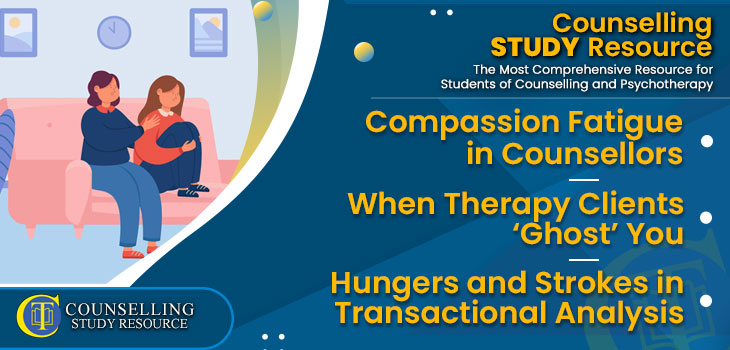269 – Compassion Fatigue in Counsellors
When Therapy Clients ‘Ghost’ You – Hungers and Strokes in Transactional Analysis
NOTE: The Counselling Tutor Podcast is a free resource, which is available on the main Counselling Tutor website. We also place it in CSR for your ease of access. Unlike our other CSR resources, podcast episodes may include presenters’ opinions, and are not intended to be referenced for academic use.
In Episode 269 of the Counselling Tutor Podcast, your hosts Rory Lees-Oakes and Ken Kelly take us through this week’s three topics:
- Firstly in ‘Theory in Practice’, we look at compassion fatigue in counsellors.
- Then in ‘Practice Today’, we look at what to do when a client ‘ghosts’ you, and the thoughts and feelings this might bring.
- And lastly in ‘Practice Matters’, Rory speaks with Lisa Mathurin on hungers and strokes from transactional analysis.
Compassion Fatigue in Counsellors [starts at 02:08 mins]
Counselling Foundations is sponsored by
Counselling Skills Academy
Learn counselling techniques by seeing counselling skills used in real sessions by qualified therapists.
Real sessions - real-life presentations - real skills.
Compassion fatigue will not only affect you, but also your clients and your practice.
Some of the signs of compassion fatigue in counsellors and what you can do to tackle it are highlighted in this section:
- Compassion fatigue is empathy failure – struggling to see from the client’s frame of reference.
- Burnout
- One of the signs of compassion fatigue in counsellors is feeling tired of dealing with the same type of client repeatedly, e.g. grief.
- Difficulty separating work life from personal life.
- Look out for negative thinking, intrusive images, or either a hypersensitivity or an insensitivity to the emotional material brought by the client.
- Dreading working with some clients and being overly optimistic about others.
- Make regular visits to your supervisor – an observant supervisor will pick up on the signs that you might be experiencing compassion fatigue.
- Make sure you're keeping on top of your self-care and reduce your client load if necessary.
- Keep an eye out for these thoughts and feelings that could be a clue you're experiencing compassion fatigue.
A handout on Counsellor Compassion Fatigue is available for download in the green button above.
When Therapy Clients ‘Ghost’ You [starts at 19:49 mins]
In this section, Rory and Ken discuss what thoughts and feelings we might experience when a client ‘ghosts’ us.
The key points of this section include:
- ‘Ghosting’ – when a client disappears e.g. stops showing up to any sessions, doesn’t reply to your texts, calls, emails, etc.
- It’s the client’s choice, but it can leave us questioning ourselves – ‘did I do something wrong?’, ‘did I make them uncomfortable in any way?’.
- Overanalyzing the situation won’t help anything, it’s important to try and not be hard on yourself for it.
- Remember that it is the clients’ choice, and well within their rights to not have any further sessions.
- The client may have realised they’re not ready/find sharing what they're struggling with too difficult.
- Try not to take their decision personally.
Hungers and Strokes in Transactional Analysis [starts at 30:32 mins]
The National Counselling Society is proud to sponsor Practice Matters.
NCS are really excited to have launched their Children and Young People Therapist Register for counsellors working with the younger age group.
In this week’s ‘Practice Matters’, Rory speaks with Lisa Mathurin about hungers and strokes from transactional analysis.
The main points of this discussion are as follows:
- Hungers– fundamental drives that motivate our behaviour.
- As a child, these things are as necessary to our development as food.
- Some examples could be stimulus hunger, and recognition hunger.
- A ‘badly behaved’ child – what are they hungry for? Is it attention (recognition hunger)?
- Consistency and balance across the board is required for this development to succeed.
- Strokes – a unit of recognition.
- The importance of structure.
- Strokes can be positive or negative, conditional or unconditional, verbal or nonverbal, and direct or indirect.
- Strokes can be filtered out – if we’re used to negative strokes, we may struggle to accept positive ones e.g. taking a compliment.
- Strokes from within – celebrating your own achievements, validating ourselves.


